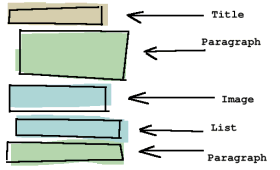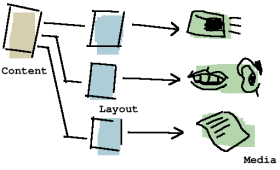Tuesday, August 12, 2003
HTML, XHTML, CSS and SEO Purism
A List Apart (for people who make websites) briefly covers Using XHTML/CSS for an Effective SEO Campaign (4 August 2003).
It’s all about structuring your HTML with meaningful mark-up.

Don’t forget that all of the tips given serve the end-user as well, not just the Googlebot. Also, search engines at this time don’t care about HTML doctypes — plain old HTML4 Strict should work just as well as XHTML.
HTML/XHTML/CSS?
Here’s a brief overview of the meaning behind HTML/XHTML/CSS:
First, there was Tim Berners-Lee who created HTML (along with the WWW) to better connect his Intranet at CERN. He created it with accessibility in mind: different devices and different computer systems were even more common than today. In order to base it on a popular standard, HTML became SGML-based.
The killer-app for the World Wide Web was the Mosaic browser. When in the mid-90s the Web took off, soon, the big browser wars followed (Netscape Navigator vs Internet Explorer). Browser vendors implemented their own pseudo-standards outside the W3C (the World Wide Web Consortium, headed by Berners-Lee). Somehow, HTML3.0 never took off — instead, the W3C followed-up with HTML3.2. It’s still alive today, bringing nasty table-layout online — the whole original intention of content-layout separation and device independence forgotten.
Browser vendors were facing a lot of criticism from web developers for their sins of blinking and scrolling HTML gimmicks outside the official guidelines. Because it makes life harder for a developer. Instead of creating one page for every system, medium (screen, print, text-to-speech, ...) and browser, now workarounds, extra-sites and multiple versions of the same code had to be developed.
HTML4 was a step ahead, and a step back (in the right direction). It focussed on stylesheets (CSS) again. HTML contains the content and structure, while Cascading StyleSheets define the actual layout. This separation makes it possible to deliver the same content, and let the client grab the preferred stylesheet (like when printing the page, the print style, or when displaying the page on a mobile phone with WAP2 — which is XHTML1-based, getting rid of WML — the handheld style).

Structured HTML formatting also makes it easy for clients to render the content in any preferred way, outside of any CSS definitions. HTML4 Strict is the “original” HTML — while HTML4 Transitional allows authors to continue using deprecated elements.
After HTML4, there was XHTML1. The difference being that HTML is now XML-based. SGML allows for more optional syntax which makes it harder to evaluate a document quickly. (These days, the combination of different XML-standards is heading in the exact same direction of being overtly complicated for most uses.) XHTML is an XML-application. In short, tags have to be closed now. Browsers mostly don’t care what they’re served and try to hide any errors, but there’s the phenomenon of doctype-sniffing — a browser might jump into a faster and more correct “standards-compliant” rendering approach upon detecting certain doctypes.
And what’s all this to a search engine? Of course, a searchbot is just another client. The searchbot is blind; purists were preaching since ever to make sure a blind user should be able to navigate. Some people back then would argue that it’s just not pragmatic to care for minorities. I’ve had to listen to this in my job, trying to tell my boss to be brave and use CSS, Alt-texts, Strict in 1998... but the argument that it helps the blind to read online just wasn’t enough for him (it actually speeds up development time, which should be a better argument to those who have to watch the budget — interestingly enough, now my ex-boss will check sites with the Lynx browser to see if they’re well-made).
These days, things are very different. Google has become so important for marketing that nobody wants to create inaccessible sites (sites accessible only with certain settings, like forcing the user to enable JavaScript, or images). SEO is the big buzz-word. It was around since ever, and before Google (just under a different terminology.) And some countries, like the USA, introduced laws forcing government sites to become accessible.
Many people, however, still use deprecated mechanisms to get their point across. Invalid HTML makes up 99.9% of the web (this is an optimistic estimation). Table-layout is predominant online. It’s like putting paper on the screen, with all the disadvantages that come with such an approach, and none of the advantages paper has.
As far as I know, Google won’t care about minor code-bloat. A List Apart is suggesting something else in their article:
“Some of the best methods of optimizing a website are ensuring that a page is not overly heavy in file size, maintaining a good content to code ratio, using lots of relevant content, and filling the page with as much text and links as you can without spamming the search engine spiders.”
– Brandon, Using XHTML/CSS for an Effective SEO Campaign (A List Apart), 4 August 2003
As the Web is getting even more competitive, it would be fine to see a major search engine become brave enough to care about the trash they feed on everyday... and to stop eating some of it. Within weeks, many big players would have to make their sites even more accessible. Which would convince even the last user to get rid of the one browser that hurt web development and CSS more than anything else: Netscape 4*.
And suddenly, the Web would be closer to the vision the man at CERN had in mind back then.
*Mention this browser to a web programmer, and he will grin madly, remembering days spent on “optimizing” — knowing that every single Netscape 4 optimization is making the page less accessible for every other browser on the planet.
Google, after Tim Berners-Lee, could become the next Web purist with real power — and the right argument to convince people. Money.
Google Ping
Tristan pointed me to his Google Ping idea:
“I’ve been spending some time playing around with the Google API and can’t help but think there is a piece missing: That of sending data to Google via this interface. The concept is hardly new as weblog software like mine already sends information out to such services as Weblogs.com, Blo.gs, Blogrolling and Technorati, telling them that my page has been updated.
Considering the fact that Google already has both an XML-RPC and a SOAP bridge, it seems that this kind of service would be a no-brainer. Here’s how it would work: A message would be sent out in XML to either of the service and would include the title of the page, its URL, a status code (either new, updated or deleted), and specify the level of crawling you want (page or site). The google service would then take this info and crawl the specific page or site as required.”
– Tristan Louis, Google Ping, August 12, 2003
Google Rhymes
If you’re out of creative energy, try Google rhymes. It’s easy: you start with any sentence, say, “for all my life I was looking”. Now replace every word with an asterisk, except the last one; replace it with a word from a rhyme dictionary (for “looking”, we get “cooking”).
Now do a Google phrase search for “* * * * * * cooking”.
Take the best of the highlighted phrases from the result page, and use it as second line. Think of a new random line, and so on.
You’ll get truly poetic dada results like this one:
For all my life I was looking
Of any dish. Share recipes, get cooking
Whenever I thought I had found
More than 500000 alumni, Outward Bound
I realized that all I had
Broken! To see all the bad
(By the way: Google rhymes on coogle, ogle, gogel, fogle, mogle, nogle, bogle, hogle, dogle, gaggle, geigle, giggle, gurgle, and noggle.)
New Google Calculator Feature
AllTheWeb’s already got one. Now Google can do calculations for you as well:
“To use Google’s built-in calculator function, simply enter the expression you’d like evaluated in the search box and hit the Enter key or click the Google Search button. The calculator can evaluate mathematical expressions involving basic arithmetic (5+2*2 or 2^20), more complicated math (sine(30 degrees) or e^(i pi)+1), units of measure and conversions (100 miles in kilometers or 160 pounds * 4000 feet in Calories), and physical constants (1 a.u./c or G*mass of earth/radius of earth^2). You can also experiment with other numbering systems, including hexadecimal and binary.”
– Google Web Search Features
Try it with 6*7. Let’s hope there’s no Vogon ship around when Googleplex will finally be able to give you the answer on the meaning of life, the universe, and everything.
>> More posts
Advertisement
This site unofficially covers Google™ and more with some rights reserved. Join our forum!
